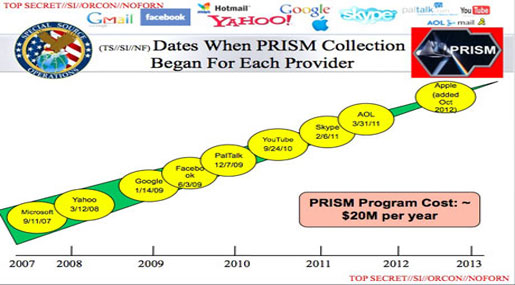
UK Ministers Challenged over British GCHQ’s Access to PRISM

Local Editor
British Ministers are under pressure to explain whether they authorized the British Government Communications Headquarters (GCHQ) to gather intelligence on Britons from the world's biggest internet companies via the top-secret program PRISM run by America's spy agency National Security Agency.
MPs, academics and campaign groups rounded on the government after the British Guardian daily disclosed that GCHQ, the UK's electronic eavesdropping and security headquarters, had been supplied with information from the top secret system.
 According to documents obtained by the Guardian, the agency generated 197 intelligence reports from PRISM last year, and has had access to the program since at least 2010.
According to documents obtained by the Guardian, the agency generated 197 intelligence reports from PRISM last year, and has had access to the program since at least 2010.
On Friday, British MPs challenged the UK Prime Minister David Cameron, the Foreign Minister William Hague, who oversees the work of GCHQ, and Home Secretary Theresa May to reveal what they knew of PRISM.
On this note, David Davis, the former Shadow Home Secretary, told the Guardian, "It is a perfectly reasonable question to put to the foreign secretary: did you or did you not authorize all of these Prism intercepts on British citizens? It is perfectly appropriate for him to answer that."
Yvette Cooper, the Shadow Home Secretary, stated that the parliament's Intelligence and Security Committee (ISC) should launch an immediate inquiry into PRISM, the nature of the intelligence being gathered, and the extent of UK oversight by ministers.
The ISC is due to travel to Washington next week, allowing British officials to question the US about the program.
Sir Malcolm Rifkind, chairman of the ISC said on Friday night that it is due to be given a report on claims that GCHQ received material through the secret PRISM scheme soon, according to the daily.
The details of GCHQ's use of PRISM were obtained by the Guardian daily, in which the papers were prepared for senior analysts working at America's National Security Agency.
 The documents, which appear in the form of a 41-page PowerPoint presentation, suggest the firms co-operated with the Prism program included "Microsoft, Yahoo, Google, Facebook, PalTalk, AOL, Skype, YouTube, Apple."
The documents, which appear in the form of a 41-page PowerPoint presentation, suggest the firms co-operated with the Prism program included "Microsoft, Yahoo, Google, Facebook, PalTalk, AOL, Skype, YouTube, Apple."
Unless GCHQ has stopped using Prism, the agency has accessed information from the program for at least three years.
Asked to comment on its use of Prism, GCHQ said it "takes its obligations under the law very seriously. Our work is carried out in accordance with a strict legal and policy framework which ensures that our activities are authorized, necessary and proportionate, and that there is rigorous oversight, including from the secretary of state, the interception and intelligence services commissioners and the intelligence and security committee".
The United States National Security Agency (NSA) and FBI are tapping directly into the central servers of nine leading US Internet companies, extracting audio and video chats, photographs, e-mails, documents, and connection logs that enable analysts to track foreign targets, according to a top-secret document obtained by The US daily The Washington Post and the Guardian.
According to the Washington Post, "The NSA prides itself on stealing secrets and breaking codes, and it is accustomed to corporate partnerships that help it divert data traffic or sidestep barriers."
Moreover, several companies had denied any knowledge of the program, saying they did not allow direct government access to their servers and asserted that they responded only to targeted requests for information.
"We do not provide any government organization with direct access to Facebook servers," said Joe Sullivan, chief security officer for Facebook. "When Facebook is asked for data or information about specific individuals, we carefully scrutinize any such request for compliance with all applicable laws, and provide information only to the extent required by law."
"We have never heard of PRISM," said Steve Dowling, a spokesman for Apple. "We do not provide any government agency with direct access to our servers, and any government agency requesting customer data must get a court order."
However, US Government officials and the document itself made clear "98 percent of PRISM production is based on Yahoo, Google and Microsoft; we need to make sure we don't harm these sources."
Source: The Guardian UK, edited by website team
Comments



